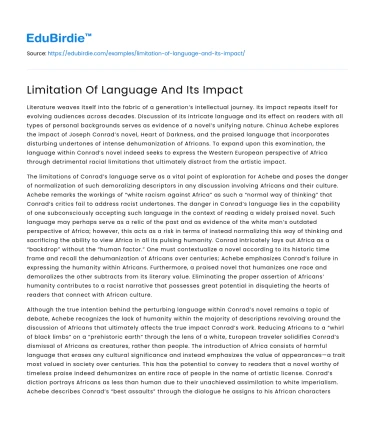Literature weaves itself into the fabric of a generation’s intellectual journey. Its impact repeats itself for evolving audiences across decades. Discussion of its intricate language and its effect on readers with all types of personal backgrounds serves as evidence of a novel’s unifying nature. Chinua Achebe explores the impact of Joseph Conrad’s novel, Heart of Darkness, and the praised language that incorporates disturbing undertones of intense dehumanization of Africans. To expand upon this examination, the language within Conrad’s novel indeed seeks to express the Western European perspective of Africa through detrimental racial limitations that ultimately distract from the artistic impact.
The limitations of Conrad’s language serve as a vital point of exploration for Achebe and poses the danger of normalization of such demoralizing descriptors in any discussion involving Africans and their culture. Achebe remarks the workings of “white racism against Africa” as such a “normal way of thinking” that Conrad’s critics fail to address racist undertones. The danger in Conrad’s language lies in the capability of one subconsciously accepting such language in the context of reading a widely praised novel. Such language may perhaps serve as a relic of the past and as evidence of the white man’s outdated perspective of Africa; however, this acts as a risk in terms of instead normalizing this way of thinking and sacrificing the ability to view Africa in all its pulsing humanity. Conrad intricately lays out Africa as a “backdrop” without the “human factor.” One must contextualize a novel according to its historic time frame and recall the dehumanization of Africans over centuries; Achebe emphasizes Conrad’s failure in expressing the humanity within Africans. Furthermore, a praised novel that humanizes one race and demoralizes the other subtracts from its literary value. Eliminating the proper assertion of Africans’ humanity contributes to a racist narrative that possesses great potential in disquieting the hearts of readers that connect with African culture.
Save your time!
We can take care of your essay
- Proper editing and formatting
- Free revision, title page, and bibliography
- Flexible prices and money-back guarantee
Although the true intention behind the perturbing language within Conrad’s novel remains a topic of debate, Achebe recognizes the lack of humanity within the majority of descriptions revolving around the discussion of Africans that ultimately affects the true impact Conrad’s work. Reducing Africans to a “whirl of black limbs” on a “prehistoric earth” through the lens of a white, European traveler solidifies Conrad’s dismissal of Africans as creatures, rather than people. The introduction of Africa consists of harmful language that erases any cultural significance and instead emphasizes the value of appearances—a trait most valued in society over centuries. This has the potential to convey to readers that a novel worthy of timeless praise indeed dehumanizes an entire race of people in the name of artistic license. Conrad’s diction portrays Africans as less than human due to their unachieved assimilation to white imperialism. Achebe describes Conrad’s “best assaults” through the dialogue he assigns to his African characters as they shout 'Eat 'im!' Conrad’s true talent lies in fully conveying an image of a deconstructed man less than human solely due to his African roots. An assignment of such limited dialogue contributes to the broken image of Africa that Conrad showcases throughout the novel. The impact of Conrad’s choice of words functions as more violent than characteristic of a compelling work of literature. However, Kethzial and Scholar instead perceive Conrad as possessing the “ability to create authentic, life-like characters.” In this criticism, Conrad’s portrayal of Africans as simpleminded and void of humanity becomes accepted and even celebrated by scholars. The authenticity of Conrad’s descriptions of his African characters lies in the wholly racist perspective western Europeans hold. Ultimately, this artistic choice to deconstruct an entire race limits the true, modern value of this novel.
The book may be read in a specific context, but not one of absolute praise ignorant of its disturbing, dehumanizing language. Praising such language without deep acknowledgement of its harmful ideals communicates to its readers that one may still view an African in such a way—given artistic license to do so. Artistic license cannot excuse the praising of a work that includes racist language. A truly powerful novel incorporates language in such a way to capture the fascination of its readers—not to exclude or make a group of its readers extremely uncomfortable at the least. A novel describing western Europeans as barbaric would most likely not have the same intrinsic effect; in fact, such a novel may become dismissed by not only a majority, but a powerful majority with the white privilege of a voice that reaches the masses. Achebe describes the novel as praised for its stylistic features by its greatest fans; these fans, however, also seem to conveniently leave out elaborate discussion of its racist language. A novel written in such a style may become part of a literature class’s curriculum if and only if constructive discussion of the limitations of its language in regard to Africa becomes a point of extensive exploration. Such a novel, otherwise, only perpetuates this language and fails to serve as a truly compelling work of art, capable of reaching the hearts of any reader despite cultural associations.
Did you like this example?
Make sure you submit a unique essay
Our writers will provide you with an essay sample written from scratch: any topic, any deadline, any instructions.
Cite this paper
-
APA
-
MLA
-
Harvard
-
Vancouver
Limitation Of Language And Its Impact.
(2022, February 17). Edubirdie. Retrieved December 22, 2024, from https://edubirdie.com/examples/limitation-of-language-and-its-impact/
“Limitation Of Language And Its Impact.” Edubirdie, 17 Feb. 2022, edubirdie.com/examples/limitation-of-language-and-its-impact/
Limitation Of Language And Its Impact. [online].
Available at: <https://edubirdie.com/examples/limitation-of-language-and-its-impact/> [Accessed 22 Dec. 2024].
Limitation Of Language And Its Impact [Internet]. Edubirdie.
2022 Feb 17 [cited 2024 Dec 22].
Available from: https://edubirdie.com/examples/limitation-of-language-and-its-impact/
copy






 Stuck on your essay?
Stuck on your essay?

